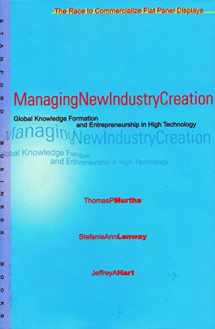
Managing New Industry Creation: Global Knowledge Formation and Entrepreneurship in High Technology
Book details
Summary
Description
This book concerns industry creation as knowledge creation. The authors argue that a new class of global, knowledge-driven manufacturing industries has emerged in which learning, continuity, and speed define competition. In these new industries, access to knowledge creation processes matters more than ownership of physical assets. Location matters only insofar as it confers learning advantages and market access. Companies need strategies that can mobilize their organizations' country-specific strengths and freely leverage them in open, global learning partnerships with allies, suppliers, and customers. Managing New Industry Creation distills principles that managers can use to seize leadership for their companies as these new industries emerge.
The authors draw their insights from firsthand discussions with over 160 managers and scientists who helped found the high-information-content flat panel display (FPD) industry. In the early 1990s, large-format FPDs exploded into public knowledge as a critical enabling technology for notebook computers. In the future, FPDs will increasingly function as the face by which users interact with technology products. The book recounts the business decisions that propelled the industry from humble beginnings to empower a globally mobile workforce and eventually build wall-hanging, high definition televisions that every household can afford.
The FPD industry was the first new manufacturing industry to fully emerge in a global economy defined more by trade in knowledge than in physical products. Although FPDs were commercialized in Japan, the joint efforts of an international community of companies made high-volume production of large displays viable. Companies from outside of Japan―including IBM, Applied Materials, and Corning―achieved key positions by challenging U.S.-centered preconceptions of innovation, new business creation, and management process, giving unprecedented global authority and responsibility to their Japanese affiliates. Their success established new rules for competing in the knowledge-driven, global manufacturing industries of the future, first described here for managers, R&D scientists, academics, and students of corporate strategy.


We would LOVE it if you could help us and other readers by reviewing the book
Book review



